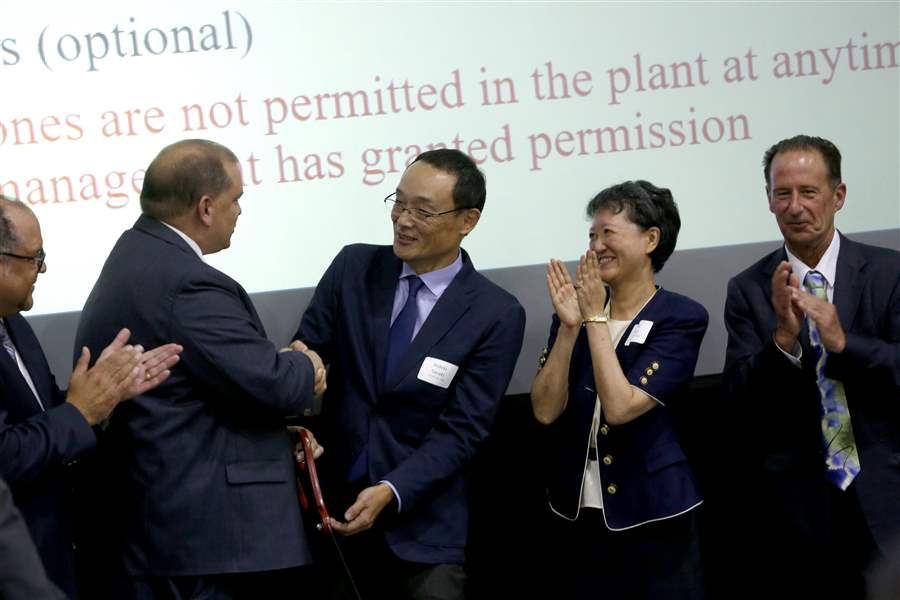
Japanese automotive company opens first North American plant in Toledo
9/7/2018
Toledo Mayor Wade Kapszukiewicz, 2nd from left, shakes hands with Topia CEO Hideki Sasaki during a ribbon cutting for Toledo-based company TPAM, a Japanese auto parts subsidiary of Topia.
THE BLADE/LORI KING
Buy This Image

Toledo Mayor Wade Kapszukiewicz, 2nd from left, shakes hands with Topia CEO Hideki Sasaki during a ribbon cutting for Toledo-based company TPAM, a Japanese auto parts subsidiary of Topia.
Topia, a Japanese firm that makes prototype parts for the automotive industry, has chosen Toledo for the location of its first North American plant.
The company — which became operational Wednesday and held an official grand opening Friday featuring dignitaries from Japan and Ohio — is investing $4 million for robotic welders and other equipment to do prototype production in a 61,000-square-foot former bakery building located in the North-Cross Industrial Park off of Suder Avenue in North Toledo.
The new operation called TPAM, which stands for Topia America, will focus on automotive companies in the Detroit area (where it already has one client) but also Ohio and Canada.
A variety of automotive parts — everything from door frames to exhaust pipes to seat belt clamps — are likely to be made at the plant.
But whatever gets made usually doesn’t show up in dealer’s showroom car for another three to five years, said Masahiro Shimada, the TPAM plant manager.
“Our target market is prototyping and we do a lot of BIW,” Mr. Shimada said. BIW stands for Body in White, which is an auto manufacturing stage in which a car body's components are joined together using one or multiple techniques such as spot welding, riveting, clinching, bonding, or laser brazing. The term refers parts that have not been painted and before an engine, a chassis, or trim have been assembled in auto’s frame.
TPAM has already built five component bays where it can assemble prototype parts using a variety of the aforementioned techniques. It will be able to build hundreds of prototypes parts, which automakers then use in mockups or prototype cars that may eventually come to market.
“The testing of the parts is always done by the automotive companies,” Mr. Shimada said. “We only produce the part. How many depends on the order but we can do small parts or large ones. It’s really up to the automotive company.”
TPAM, which only decided to place a plant in Toledo last January, just finished installing equipment on Wednesday and for now, has 15 employees. It will expand to 30 employees quickly as it ramps up production.
But Mr. Shimada said how many more it might add in the coming year will depend on how good business is.
Topia, Japan’s largest independent prototyping company with headquarters in Suzuka, located about 230 miles southwest of Tokyo, expanded to China about 15 years ago with a factory near Shanghai. It began with 50 workers, soon grew to 250, and is now expanding operations there that will use about 500 workers.
Mr. Shimada said the market will decide how big the Toledo operation will become, adding TPAM will be very flexible in what it can offer clients. And unlike some Japanese suppliers tied to a specific manufacturer, TPAM is independent and able to seek business from every auto manufacturer.
It chose Toledo because it saw great opportunity and access to the Detroit and Canadian markets. The company already had established a sales office in Novi, Mich.
“We understand that Detroit is the key area to do development in the automotive business,” Mr. Shimada said.
Columbus officials courted Topia before the Japanese firm, which was formed in 1973, took a look at Findlay. “They came to our headquarters with the mayor of Findlay,” Mr. Shimada said.
But then the Regional Growth Partnership showed company officials the North-Cross site — which sits on the Ohio-Michigan border — and its ready access to Detroit and Canada.
TPAM received numerous grants and incentives through JobsOhio, the Ohio Tax Credit Authority, the city of Toledo, and Lucas County.
“The incentives we could get in the end were about the same, so we decided to open up in Toledo,” Mr. Shimada said.
Opening a new American operation has meant that Mr. Shimada, 43, had to leave his wife and two children behind in Japan. But the Toledo area has had some small compensation.
As a fisherman, the Maumee River is just five minutes from the plant manager’s apartment. And the area is a hotbed of bluegrass music, a pleasant surprise for Mr. Shimada, who is a bluegrass aficionado and an accomplished mandolin player.
In Japan, he used to play bluegrass music as a member of “Dry Grass” a band led by his father, a banjo player. Since moving to the Toledo area Mr. Shimada already has been recruited to play with area bluegrass musicians. “I play bass, banjo, guitar, and mandolin. But I focus on mandolin,” he said.
Contact Blade Business Writer Jon Chavez at jchavez@theblade.com or 419-724-6128.